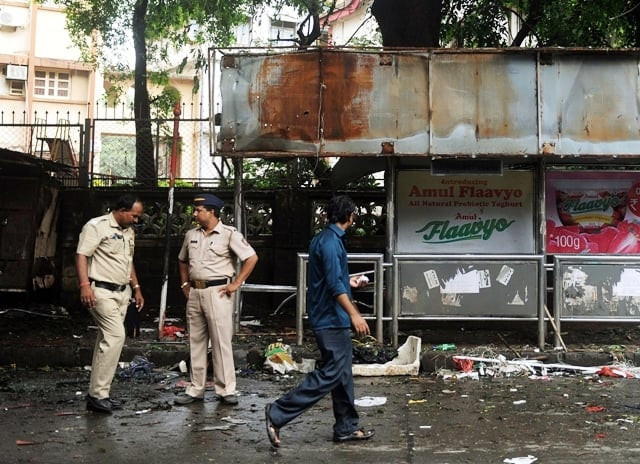Indian police trawl for Mumbai blasts lead
Two suspected members of the Indian Mujahideen militant group have been quizzed.

Home secretary RK Singh told reporters in New Delhi that "people are being questioned based on our previous databases and previous known linkages" to help find those responsible for Wednesday's deadly rush-hour blasts.
Singh's department has said two suspected members of the Indian Mujahideen militant group, arrested in Mumbai last week on suspicion of involvement in bomb attacks in the western city of Ahmedabad in 2008, have been quizzed.
Others questioned about the three co-ordinated blasts included people with links to underworld gangs and "anti-social elements" in Mumbai, the Press Trust of India news agency said, quoting an unnamed anti-terrorism squad officer.
"We believe we are moving in the right direction," the officer added.
Singh, meanwhile, said police had identified the owner of a scooter in which explosives were hidden at one of the three bomb sites.
Asked about possible "cross-border" involvement in the attacks the politician said detectives were following up on an email "which originated elsewhere", without elaborating.
Investigators have been scrambling for a breakthrough in the case, amid fears torrential downpours that have hit India's financial and entertainment capital since the blasts may have washed away vital forensic clues.
Teams of detectives are scouring hours of grainy security camera footage taken from the bomb sites in south and south central Mumbai to try to assemble a complete picture of what happened.
Forensic examination of debris has already indicated that the bombs, hidden in the crowded streets, used ammonium nitrate, a fertiliser ingredient commonly used in improvised explosive devices.
On Thursday evening, the head of the Maharashtra state Anti-Terrorist, Squad, Rakesh Maria, admitted the seasonal rainstorms had hindered the scientists.
Devices using ammonium nitrate have been used in the past by the Indian Mujahideen, which has claimed responsibility for a number of attacks across India in recent years.
Maria declined to speculate on who was responsible and struck a note of caution about reports that a severed head found at one of the scenes and a body embedded with wires suggested a suicide attack.
"We are not confining ourselves to any one group. At the moment all possibilities are being examined," he told reporters.
"As the investigation progresses, the angles, the possibilities narrow down and we will be able to pinpoint the individuals responsible for this... All angles are being covered. It's too early to say human bomb."
The chief minister of Maharashtra, Prithviraj Chavan, was also cautious but said indications that remote-control timers were discovered "logically" ruled out the possibility of a suicide attack.
India's Prime Minister Manmohan Singh has vowed that those responsible will face swift justice.
But Indian newspapers on Friday focused on the lack of an immediate breakthrough, amid widespread anger at the return of terror to the city after the 2008 attacks on Mumbai that left 166 people dead and more than 300 wounded.
"Intel: 0 Leads: 0" said a front page headline on the local Daily News and Analysis, questioning Interior Minister P. Chidambaram's assertion on Thursday that there had been no intelligence failure.
The daily said promises to improve intelligence sharing and set up fully functional rapid-reaction squads to deal with terror strikes had not been fulfilled.
India's police, security and intelligence agencies were heavily criticised for their response to the brazen Islamist militant strike in November 2008, which hit landmark targets in the city.
In a television interview aired Friday, Chavan said accusations of intelligence failures were "harsh" and while there was a need for better security measures and wider public awareness, blanket monitoring was not possible.
"(If) simply a group of three to four people get together, the chances of generating intelligence are very much less," he told NDTV.


1724319076-0/Untitled-design-(5)1724319076-0-208x130.webp)
















COMMENTS
Comments are moderated and generally will be posted if they are on-topic and not abusive.
For more information, please see our Comments FAQ